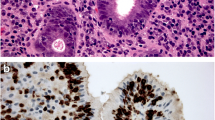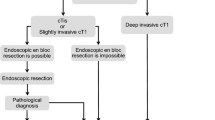Abstract
Background
Since colorectal adenoma or cancer is commonly associated with gastric adenoma or cancer, early colorectal adenoma detection can affect the survival of gastric adenoma or cancer patients.
Aims
The purpose here was to investigate the colorectal adenoma or cancer prevalence and evaluate the necessity for screening colonoscopy in gastric adenoma or cancer patients.
Patients and methods
From September 2005 through August 2010, 857 patients younger than 70 years who had gastric adenoma or cancer were enrolled. Healthy age- and sex-matched controls were selected from the general screening population. The prevalence and risk of colorectal adenoma or cancer were compared between the participants and the controls.
Results
Data from 416 patients in the gastric neoplasm group (123 with gastric adenoma and 293 with gastric cancer) and 416 healthy control group participants were included in the statistical analysis. The presence of gastric adenoma or cancer was an independent risk factor for colorectal neoplasm (OR = 1.348, 95 % CI = 1.001–1.815). Patients with diffuse type gastric cancer had a lower prevalence of colorectal adenoma or cancer than those with gastric adenoma or intestinal type cancer. In gastric cancer patients younger than 50 years, intestinal type histology was significantly associated with colorectal adenoma or cancer (OR = 3.838, 95 % CI = 1.077–13.677).
Conclusions
The colorectal adenoma or cancer risk was significantly increased in patients with gastric adenoma or cancer. Therefore, screening colonoscopy should be considered for gastric adenoma or cancer patients including young patients, in the case of intestinal type gastric cancer.


Similar content being viewed by others
References
Jung KW, Park S, Won YJ, et al. Prediction of cancer incidence and mortality in Korea, 2011. Cancer Res Treat. 2011;43:12–18.
Kang KJ, Lee JH. Characteristics of gastric cancer in Korea—with an emphasis on the increase of the early gastric cancer (EGC). J Korean Med Assoc. 2010;53:283–289.
Kim HO, Hwang SI, Yoo CH, Kim H. Preoperative colonoscopy for patients with gastric adenocarcinoma. J Gastroenterol Hepatol. 2009;24:1740–1744.
Mizoue T, Yoshimura T, Tokui N, et al. Prospective study of screening for stomach cancer in Japan. Int J Cancer. 2003;106:103–107.
Tan YK, Fielding JW. Early diagnosis of early gastric cancer. Eur J Gastroenterol Hepatol. 2006;18:821–829.
Ikeguchi M, Ohfuji S, Oka A, Tsujitani S, Maeda M, Kaibara N. Synchronous and metachronous primary malignancies in organs other than the stomach in patients with early gastric cancer. Hepatogastroenterology. 1995;42:672–676.
Eom BW, Lee HJ, Yoo MW, et al. Synchronous and metachronous cancers in patients with gastric cancer. J Surg Oncol. 2008;98:106–110.
Ikeda Y, Saku M, Kawanaka H, Nonaka M, Yoshida K. Features of second primary cancer in patients with gastric cancer. Oncology. 2003;65:113–117.
Lee JH, Bae JS, Ryu KW, et al. Gastric cancer patients at high-risk of having synchronous cancer. World J Gastroenterol. 2006;12:2588–2592.
Lim SB, Jeong SY, Choi HS, et al. Synchronous gastric cancer in primary sporadic colorectal cancer patients in Korea. Int J Colorectal Dis. 2008;23:61–65.
Arai T, Sawabe M, Takubo K, Kanazawa K, Esaki Y. Multiple colorectal cancers in the elderly: a retrospective study of both surgical and autopsy cases. J Gastroenterol. 2001;36:748–752.
Ueno M, Muto T, Oya M, Ota H, Azekura K, Yamaguchi T. Multiple primary cancer: an experience at the Cancer Institute Hospital with special reference to colorectal cancer. Int J Clin Oncol. 2003;8:162–167.
Yamamoto S, Yoshimura K, Ri S, Fujita S, Akasu T, Moriya Y. The risk of multiple primary malignancies with colorectal carcinoma. Dis Colon Rectum. 2006;49:S30–S36.
Bae RC, Jeon SW, Cho HJ, Jung MK, Kweon YO, Kim SK. Gastric dysplasia may be an independent risk factor of an advanced colorectal neoplasm. World J Gastroenterol. 2009;15:5722–5726.
Park SY, Kim HS, Yoon KW, et al. Prevalence of colorectal adenoma is increased in patients with gastric adenoma. Korean J Gastroenterol. 2009;54:220–226.
Yang MH, Son HJ, Lee JH, et al. Do we need colonoscopy in patients with gastric adenomas? The risk of colorectal adenoma in patients with gastric adenomas. Gastrointest Endosc. 2010;71:774–781.
Zauber AG, Winawer SJ, O’Brien MJ, et al. Colonoscopic polypectomy and long-term prevention of colorectal-cancer deaths. N Engl J Med. 2012;366:687–696.
Lauren P. The two histological main types of gastric carcinoma: diffuse and so-called intestinal-type carcinoma. An attempt at a histo-clinical classification. Acta Pathol Microbiol Scand. 1965;64:31–49.
Joo MK, Park JJ, Lee WW, et al. Differences in the prevalence of colorectal polyps in patients undergoing endoscopic removal of gastric adenoma or early gastric cancer and in healthy individuals. Endoscopy. 2010;42:114–120.
Oh SY, Park DI, Yoo TW, et al. Is gastric cancer a new indication for surveillance colonoscopy? Colon cancer is increased in gastric cancer patients. Korean J Gastroenterol. 2006;47:191–197.
Park DI, Park SH, Yoo TW, et al. The prevalence of colorectal neoplasia in patients with gastric cancer: a Korean Association for the Study of Intestinal Disease (KASID) Study. J Clin Gastroenterol. 2010;44:102–105.
Yang P, Zhou Y, Chen B, et al. Overweight, obesity and gastric cancer risk: results from a meta-analysis of cohort studies. Eur J Cancer. 2009;45:2867–2873.
Jung MK, Jeon SW, Cho CM, et al. Hyperglycaemia, hypercholesterolaemia and the risk for developing gastric dysplasia. Dig Liver Dis. 2008;40:361–365.
Yamagata H, Kiyohara Y, Nakamura S, et al. Impact of fasting plasma glucose levels on gastric cancer incidence in a general Japanese population: the Hisayama study. Diabetes Care. 2005;28:789–794.
Miyoshi E, Haruma K, Hiyama T, et al. Microsatellite instability is a genetic marker for the development of multiple gastric cancers. Int J Cancer. 2001;95:350–353.
Nakatsuru S, Yanagisawa A, Ichii S, et al. Somatic mutation of the APC gene in gastric cancer: frequent mutations in very well differentiated adenocarcinoma and signet-ring cell carcinoma. Hum Mol Genet. 1992;1:559–563.
Uchino S, Noguchi M, Ochiai A, Saito T, Kobayashi M, Hirohashi S. p53 mutation in gastric cancer: a genetic model for carcinogenesis is common to gastric and colorectal cancer. Int J Cancer. 1993;54:759–764.
Uchino S, Tsuda H, Noguchi M, et al. Frequent loss of heterozygosity at the DCC locus in gastric cancer. Cancer Res. 1992;52:3099–3102.
Ohtani H, Yashiro M, Onoda N, et al. Synchronous multiple primary gastrointestinal cancer exhibits frequent microsatellite instability. Int J Cancer. 2000;86:678–683.
Dominic OG, McGarrity T, Dignan M, Lengerich EJ. American College of gastroenterology guidelines for colorectal cancer screening 2008. Am J Gastroenterol. 2009;104:2626–2629.
Levin B, Lieberman DA, McFarland B, et al. Screening and surveillance for the early detection of colorectal cancer and adenomatous polyps, 2008: a joint guideline from the American Cancer Society, the US Multi-Society Task Force on Colorectal Cancer, and the American College of Radiology. Gastroenterology. 2008;134:1570–1595.
Saito S, Hosoya Y, Togashi K, et al. Prevalence of synchronous colorectal neoplasms detected by colonoscopy in patients with gastric cancer. Surg Today. 2008;38:20–25.
Chan AO, Luk JM, Hui WM, Lam SK. Molecular biology of gastric carcinoma: from laboratory to bedside. J Gastroenterol Hepatol. 1999;14:1150–1160.
Stadtländer CT, Waterbor JW. Molecular epidemiology, pathogenesis and prevention of gastric cancer. Carcinogenesis. 1999;20:2195–2208.
Tahara E, Semba S, Tahara H. Molecular biological observations in gastric cancer. Semin Oncol. 1996;23:307–315.
Correa P. Human gastric carcinogenesis: a multistep and multifactorial process–First American Cancer Society Award Lecture on Cancer Epidemiology and Prevention. Cancer Res. 1992;52:6735–6740.
Solcia E, Fiocca R, Luinetti O, et al. Intestinal and diffuse gastric cancers arise in a different background of Helicobacter pylori gastritis through different gene involvement. Am J Surg Pathol. 1996;20:S8–S22.
Kim HS, Woo DK, Bae SI, Kim YI, Kim WH. Microsatellite instability in the adenoma-carcinoma sequence of the stomach. Lab Invest. 2000;80:57–64.
Smith AM, Watson SA. Gastrin and gastrin receptor activation: an early event in the adenoma-carcinoma sequence. Gut. 2000;47:820–824.
Robertson DJ, Sandler RS, Ahnen DJ, et al. Gastrin, helicobacter pylori, and colorectal adenomas. Clin Gastroenterol Hepatol. 2009;7:163–167.
Triantafillidis JK, Govosdis V, Konstandellou E, et al. Increased fasting serum levels of growth hormone and gastrin in patients with gastric and large bowel cancer. Ann Gastroenterol. 2002;15:72–77.
Acknowledgments
There have been no sources of support, including pharmaceutical and industry support.
Conflict of interest
None.
Author information
Authors and Affiliations
Corresponding author
Rights and permissions
About this article
Cite this article
Kim, S.Y., Jung, S.W., Hyun, J.J. et al. Is Colonoscopic Screening Necessary for Patients with Gastric Adenoma or Cancer?. Dig Dis Sci 58, 3263–3269 (2013). https://doi.org/10.1007/s10620-013-2824-5
Received:
Accepted:
Published:
Issue Date:
DOI: https://doi.org/10.1007/s10620-013-2824-5




